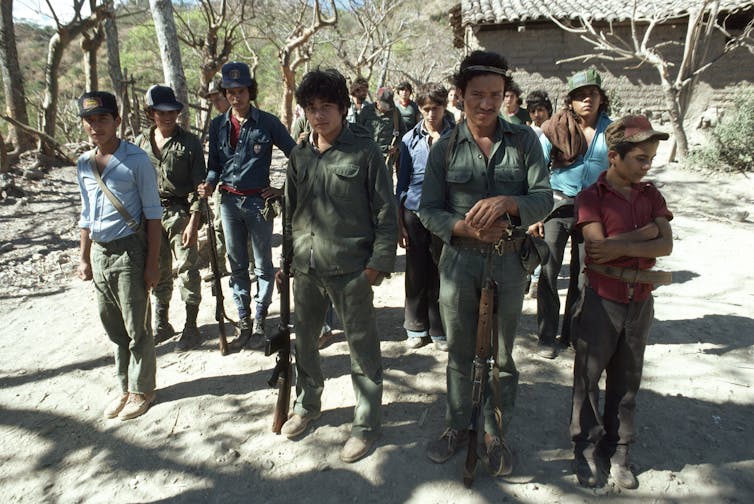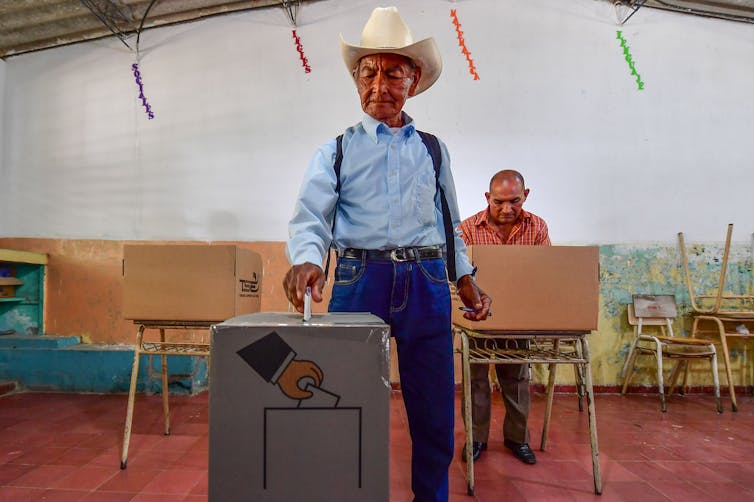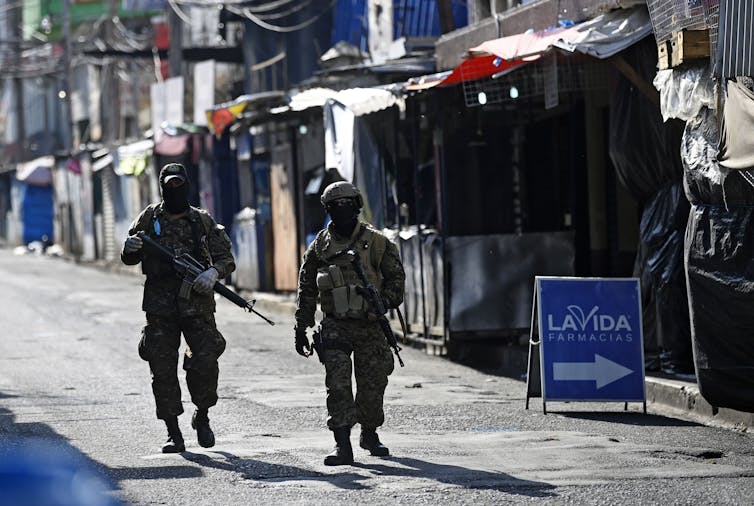El Salvador's façade of democracy crumbles as president purges his political opponents
- Written by Mneesha Gellman, Associate Professor of Political Science, Emerson College
El Salvador is in crisis after President Nayib Bukele on May 1 fired five Salvadoran supreme court justices and the attorney general[1].
The court and attorney general’s office were among the only checks on presidential power remaining since Bukele’s Nuevas Ideas party won a supermajority in Congress in March 2021, with more than 65%[2] of votes. During the pandemic, the Salvadoran judiciary repeatedly ruled[3] that the president’s uses of emergency powers were unconstitutional; Bukele defied the courts and ultimately dismissed the justices and the attorney general.
Salvadoran lawmakers supported Bukele’s purge[4] of his perceived opponents. And recent polls show more than 90% of Salvadorans[5] still support the president.
But the move drew sharp criticism from other countries[6].
“An independent judiciary is essential to democratic governance,” the U.S. State Department said of the justices’ dismissal[7].
Bukele came to power in 2019 on a tide of voters exhausted by the Salvadoran status quo – deep inequality, chronic violence and endemic corruption[8]. Voters were hopeful for something different[9]. Soon after, the authoritarian power grabs began.
On Twitter, Bukele defended the recent firings as “getting our house in order” – the kind of sweeping change he was elected to enact.
But Bukele’s anti-democratic behavior[10] is actually business as usual in a country that never fully realized its precarious democracy, as I documented in my 2017 book on memory and violence in El Salvador, Mexico and Turkey[11].
A long struggle
El Salvador struggled through centuries[12] of Spanish colonization before becoming an independent state in 1821, followed by economic manipulation and the concentration of land in the hands of wealthy elites[13].
In 1980, civil war[14] began. Leftist revolutionaries of the Farabundo Martí National Liberation Front – FMLN in its Spanish acronym – attempted to overthrow the country’s U.S.-backed[15] dictatorial and corrupt government. The war lasted until 1992 and killed 75,000[16] Salvadorans.
 Salvadoran guerrillas in Chalatenango Province, El Salvador, in February 1981.
Robert Nickelsberg/Getty Images[17]
Salvadoran guerrillas in Chalatenango Province, El Salvador, in February 1981.
Robert Nickelsberg/Getty Images[17]
After the 1992 peace accords, the FMLN converted from guerrilla group to political party, surrendering its weapons and competing electorally to change the country’s path. Many in the country and abroad believed El Salvador was becoming a democracy.
However, the FMLN lost repeatedly to the right-wing ARENA party that had governed El Salvador through the civil war. Under ARENA leadership, a culture of silence about the war[18] persisted in El Salvador. Soldiers who had committed wartime atrocities and the politicians who had authorized them avoided investigation and prosecution[19].
Democracy in process
Finally, in 2009, the FMLN won the presidency[20]. The peaceful transfer of power raised hopes that El Salvador had finally become a full democracy.
Political scientists routinely count countries as “consolidated” democracies[21] once they achieve peaceful changes of presidential party rule through free and fair elections.
But elections-focused definitions[22] of democracy don’t account for how a country’s vulnerable social groups – like Indigenous people, women and girls, people with disabilities and political activists, for example – are faring.
The foundation of any democracy is the social contract[23] — that is, the agreement about rights and responsibilities that citizens and states enact toward one another.
In El Salvador, vulnerable groups are often marginalized and do not benefit much from the protection that governments are supposed to provide their people. Their experience of democracy is superficial at best.
For all Salvadorans, the social contract is undermined by the state’s inability to keep them safe. El Salvador’s weak institutions are frequently unable to protect people from bodily harm, whether by gangs or police[24].
 El Salvador has regular, free and fair elections – a good thing, but no guarantee of a healthy, functional democracy.
Luis Acosta/AFP via Getty Images[25]
El Salvador has regular, free and fair elections – a good thing, but no guarantee of a healthy, functional democracy.
Luis Acosta/AFP via Getty Images[25]
No post-conflict government has yet accomplished the kind of structural transformation necessary for El Salvador to address its most pressing problems. Only recently, for example, was a critical investigation reopened into the most gruesome atrocities of the civil war, in the El Mozote massacre, in which the army slaughtered more than 800 villagers[26].
Successive leaders in El Salvador – including the two FMLN presidents[27] who broke the ruling party’s grasp[28] – have maintained their power while failing to root out corruption[29], implement the rule of law or build independent public institutions.
For his part, Bukele’s actions have been openly anti-democratic. For example, he brought armed soldiers into parliament[30] in 2020 while trying to push through legislation, and he regularly attacks press freedom[31].
[The Conversation’s Politics + Society editors pick need-to-know stories. Sign up for Politics Weekly[32]._]
Failed state?
It would take substantial political will – and a lot of money[33] – to fix Salvadoran poverty, gang violence, the education system and limited upward mobility. Gender-based violence is a pervasive social disease; El Salvador’s femicide rate[34] is one of the highest in the world.
On top of that, climate change-fueled storms[35] have destroyed homes and livelihoods[36]. That problem requires an international solution.
 Soldiers patrol historic downtown San Salvador in March 2021 – a common sight in militarized El Salvador.
Marvin Recinos/AFP via Getty Images[37]
Soldiers patrol historic downtown San Salvador in March 2021 – a common sight in militarized El Salvador.
Marvin Recinos/AFP via Getty Images[37]
Bukele – who at 37 was the world’s youngest president and belonged to neither major party – pledged to tackle all these problems.
But life for most Salvadorans has not improved under his leadership. People are still fleeing El Salvador en masse[38]. Last year, during the pandemic, 12,590 Salvadorans were deported by U.S. immigration enforcement; in 2019, nearly 19,000 were.
Some analysts consider El Salvador a “failed state[39],” while others have labeled it a “flawed democracy[40].”
In my analysis, Nayib Bukele’s presidency has simply removed the façade[41] that El Salvador ever became a full democracy. Free and fair elections aside, its regime is a work in progress. Under Bukele’s leadership, El Salvador is inching back toward its authoritarian past, while Salvadorans continue to hope for change.
References
- ^ fired five Salvadoran supreme court justices and the attorney general (www.bloomberg.com)
- ^ 65% (www.aljazeera.com)
- ^ repeatedly ruled (www.latinousa.org)
- ^ Salvadoran lawmakers supported Bukele’s purge (foreignpolicy.com)
- ^ 90% of Salvadorans (www.csmonitor.com)
- ^ other countries (www.univision.com)
- ^ State Department said of the justices’ dismissal (apnews.com)
- ^ chronic violence and endemic corruption (theconversation.com)
- ^ hopeful for something different (theconversation.com)
- ^ Bukele’s anti-democratic behavior (elfaro.net)
- ^ 2017 book on memory and violence in El Salvador, Mexico and Turkey (www.routledge.com)
- ^ centuries (www.bbc.com)
- ^ wealthy elites (www.jstor.org)
- ^ civil war (larrlasa.org)
- ^ U.S.-backed (www.theatlantic.com)
- ^ lasted until 1992 and killed 75,000 (www.jstor.org)
- ^ Robert Nickelsberg/Getty Images (www.gettyimages.com)
- ^ culture of silence about the war (www.tandfonline.com)
- ^ avoided investigation and prosecution (www.tandfonline.com)
- ^ FMLN won the presidency (paulalmeida.thescholr.com)
- ^ “consolidated” democracies (www.oxfordbibliographies.com)
- ^ elections-focused definitions (freedomhouse.org)
- ^ social contract (iep.utm.edu)
- ^ whether by gangs or police (fas.org)
- ^ Luis Acosta/AFP via Getty Images (www.gettyimages.com)
- ^ El Mozote massacre, in which the army slaughtered more than 800 villagers (www.wola.org)
- ^ the two FMLN presidents (www.washingtonpost.com)
- ^ broke the ruling party’s grasp (www.britannica.com)
- ^ failing to root out corruption (elfaro.net)
- ^ armed soldiers into parliament (www.reuters.com)
- ^ attacks press freedom (online.ucpress.edu)
- ^ Sign up for Politics Weekly (theconversation.com)
- ^ and a lot of money (theconversation.com)
- ^ femicide rate (nacla.org)
- ^ climate change-fueled storms (www.unep.org)
- ^ livelihoods (www.migrationpolicy.org)
- ^ Marvin Recinos/AFP via Getty Images (www.gettyimages.com)
- ^ People are still fleeing El Salvador en masse (igs.duke.edu)
- ^ failed state (www.worldpoliticsreview.com)
- ^ flawed democracy (infographics.economist.com)
- ^ façade (elfaro.net)
















